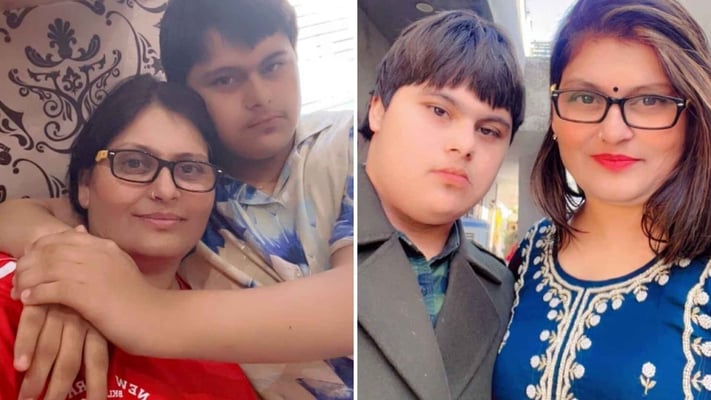Mum Rejoices As Son With Down Syndrome Gets Residency

Christchurch mother, Prince, has won a decade-long fight to bring her son, Jap Sahib, who has Down syndrome, to live with her in New Zealand, with Immigration Minister Chris Penk approving the teenager’s residency.
The decision, the mother told The New Zealand Herald, will give her son a “new life” after years of legal wrangling and appeals.
Also Read: Chch Mum Urges INZ To Let Son With Down Syndrome Return From India
The case, first reported by The Herald last month, involved Immigration New Zealand (INZ) considering applications for Jap Sahib, who initially came to New Zealand on a visitor visa with his mother in 2014 at the age of five. Subsequent student visa and visitor visa applications were rejected, and Jap was asked to leave the country. An appeal to the independent Immigration & Protection Tribunal in 2016 was also unsuccessful.
Penk confirmed to The New Zealand Herald that he had carefully considered all submissions relating to Jap Sahib and had decided to grant him a resident visa.
The breakthrough follows years of campaigning by the mother, who has worked as a chef in Christchurch for the past ten years, as well as advocacy from supporters. While she continued to work and fight for her son to join her in New Zealand, Jap remained in India under the care of his grandmother. The mother told The Herald that Jap’s father, also in India, has longstanding alcohol addiction issues.
Green MP Ricardo Menéndez March intervened in the case in May this year, urging Minister Penk to grant residency. Menéndez March told The New Zealand Herald that he was delighted with the outcome.
Aine Kelly Costello from Migrants Against the Acceptable Standard of Health Aotearoa (MAASHA) said she was overjoyed with the decision and relieved that Penk had intervened, noting that the mother had spent eight years living apart from her son. She criticised the “unjust” immigration policy, which had prevented the mother from reuniting with her child for so long.
INZ’s acceptable standard of health (ASH) policy considers whether an applicant could place “significant cost to, or demands on, New Zealand’s health services” and the potential impact on education. The mother had always maintained she could provide the additional health and education support her son required. Kelly Costello described the process as unfair, expensive, and degrading, with families forced to prove the worth of their disabled relatives at every stage.
Christchurch mother, Prince, has won a decade-long fight to bring her son, Jap Sahib, who has Down syndrome, to live with her in New Zealand, with Immigration Minister Chris Penk approving the teenager’s residency.
The decision, the mother told The New Zealand Herald, will give her son a “new life”...
Christchurch mother, Prince, has won a decade-long fight to bring her son, Jap Sahib, who has Down syndrome, to live with her in New Zealand, with Immigration Minister Chris Penk approving the teenager’s residency.
The decision, the mother told The New Zealand Herald, will give her son a “new life” after years of legal wrangling and appeals.
Also Read: Chch Mum Urges INZ To Let Son With Down Syndrome Return From India
The case, first reported by The Herald last month, involved Immigration New Zealand (INZ) considering applications for Jap Sahib, who initially came to New Zealand on a visitor visa with his mother in 2014 at the age of five. Subsequent student visa and visitor visa applications were rejected, and Jap was asked to leave the country. An appeal to the independent Immigration & Protection Tribunal in 2016 was also unsuccessful.
Penk confirmed to The New Zealand Herald that he had carefully considered all submissions relating to Jap Sahib and had decided to grant him a resident visa.
The breakthrough follows years of campaigning by the mother, who has worked as a chef in Christchurch for the past ten years, as well as advocacy from supporters. While she continued to work and fight for her son to join her in New Zealand, Jap remained in India under the care of his grandmother. The mother told The Herald that Jap’s father, also in India, has longstanding alcohol addiction issues.
Green MP Ricardo Menéndez March intervened in the case in May this year, urging Minister Penk to grant residency. Menéndez March told The New Zealand Herald that he was delighted with the outcome.
Aine Kelly Costello from Migrants Against the Acceptable Standard of Health Aotearoa (MAASHA) said she was overjoyed with the decision and relieved that Penk had intervened, noting that the mother had spent eight years living apart from her son. She criticised the “unjust” immigration policy, which had prevented the mother from reuniting with her child for so long.
INZ’s acceptable standard of health (ASH) policy considers whether an applicant could place “significant cost to, or demands on, New Zealand’s health services” and the potential impact on education. The mother had always maintained she could provide the additional health and education support her son required. Kelly Costello described the process as unfair, expensive, and degrading, with families forced to prove the worth of their disabled relatives at every stage.










Leave a Comment